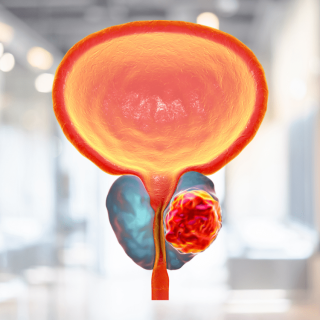
Men's Specialty
Testosterone
Testosterone is a hormone that is important for various systems in the male body. Therefore, learning more about this hormone and taking care of yourself to keep the hormone at the right level is one way for men to promote good health.
What is testosterone?
Testosterone is produced in the testicles of males. It controls the functioning of various systems in the body and helps men look more masculine. However, this hormone can also be found in women, but in very small amounts.
How does testosterone work?
Testosterone is important for almost every system in a man's body. It has the following functions:
- Maintains strength and maintains muscle mass.
- Maintains bone density.
- Helps in blood cell production, fat breakdown, and sperm production.
- Causes body and facial hair.
- Helps increase sexual desire and increase the size of the penis and testicles when sexually aroused.
How much testosterone is considered normal?
In general, men have testosterone levels of 270-1070 nanograms/deciliter. And the average is 679 nanograms/deciliter. If healthy, the testosterone level will be 400-600 nanograms/deciliter. Men will have the highest level of this hormone during adolescence to early adulthood. Then, the amount will gradually decrease as they age, decreasing by about 1 percent per year after the age of 30 or 40 years. And there will be changes in the body that show a clear decrease in testosterone in middle age or when they are 60 years old and up.
What are the effects of abnormal testosterone levels?
The amount of testosterone that decreases or increases too much will cause an imbalance of sex hormones and eventually lead to health problems. In addition to age being an important factor, there are other factors that cause testosterone levels to fluctuate.
The causes that may cause the amount of testosterone to decrease are as follows:
- Testicular injury
- Cancer treatment, which may have side effects on the reproductive system, such as radiation therapy, chemotherapy, etc.
- Chronic illnesses, such as obesity, type 2 diabetes, etc.
- Kidney health problems
- AIDS
- Hepatitis
- Alcoholism
- Stress
The decreased level of testosterone may cause health problems later. It may also affect physical performance in various aspects as follows:
- The body has less energy, including reduced strength and endurance.
- Weight gain.
- Less enthusiasm, may feel sad or depressed.
- Having problems sleeping, such as insomnia, insomnia, etc.
- Pain in the bones or joints and may cause osteoporosis.
- Decreased sexual desire.
While having a high amount of testosterone, the benefits are helping to normalize blood pressure levels, as well as reducing the risk of obesity and heart disease.
How are testosterone levels measured?
Testosterone levels can be measured through a blood test. The doctor will take a blood sample to test the hormone levels. If abnormal levels of testosterone are found, the patient may need to undergo additional tests. The results will then be analyzed to plan further treatment.
Abnormal male hormone levels, how to treat them?
Male hormone disorders can be treated by using testosterone to replace the reduced amount of hormones. Currently, there are many forms of testosterone available, such as herbs, injections, patches, ointments, or gels. The doctor will decide which type of medication is appropriate for each patient.
The advantage of testosterone treatment is that this hormone will increase the amount of red blood cells in men and accelerate the growth of the testicles. The disadvantage is that it may cause the breasts to enlarge and is not suitable for male patients with prostate or breast cancer. Therefore, the use of this hormone should be under close medical supervision. As for abnormal levels of male hormones due to certain diseases or disorders, the doctor will treat them according to the cause.
What are the effects of misuse of testosterone?
Currently, synthetic testosterone is used as a stimulant in sports competitions or to increase muscle mass. Such actions can cause dangerous side effects, such as high blood pressure, liver disease, abnormal genitals, infertility, increased irritability and aggression, etc. In addition, there is a risk of skin infections from injection needles, and the risk is even higher if used continuously for a long time.
How do you take care of yourself to maintain normal male hormone levels?
Although testosterone levels decline with age, some lifestyle changes can help keep levels of the hormone at a healthy level. Here are some tips for men:
Get enough rest. Studies have shown that insufficient sleep can reduce testosterone levels, which can also affect work performance and daily activities.
Keep your weight within the standard range. Obesity is another cause of decreased testosterone levels. Therefore, losing weight may help increase levels of this hormone.
Learn to relieve stress. One study suggests that the hormone cortisol, which is caused by stress, can interfere with the functioning of testosterone. Therefore, you should try to manage stress in various ways, such as meditation, breathing exercises, exercise, and activities that help you feel relaxed, etc.
Eat foods that contain zinc and magnesium, as these are nutrients that help maintain testosterone levels. Foods rich in zinc include meat, oysters, legumes, and grains. Magnesium is found in abundance in spinach, almonds, cashews, and peanuts.
Add good fat to your diet. Testosterone is created from cholesterol in the body, so men should eat more foods that contain good fats, such as deep-sea fish, avocados, etc. However, even though it is good fat, consumers should eat it in moderation.
Eat more fish, especially ocean fish like salmon, tuna, and mackerel, as they not only contain the right amount of good fat, but are also rich in vitamin D, which helps promote hormone production processes to work better.
Reduce sugar consumption. Since studies have shown that eating sugary foods can reduce testosterone by up to 25 percent, it is best to reduce your sugar consumption to avoid this risk.
Avoid the chemical BPA. Some research suggests that prolonged exposure to the chemical BPA, which is found in plastic food packaging, may cause lower levels of testosterone than in the general population.
Exercise regularly. Exercise can increase testosterone levels, especially weight training. It can also help you stay healthy and reduce stress.
- Categories
- Men's Specialty




